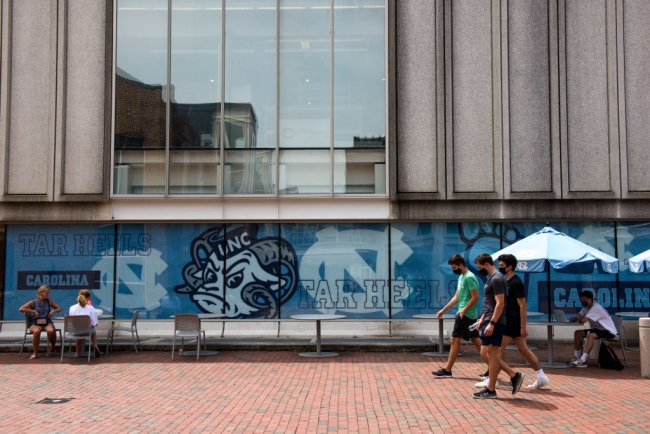You have /5 articles left.
Sign up for a free account or log in.

The University of North Carolina at Chapel Hill went online after several clusters of positive COVID-19 cases.
Melissa Sue Gerrits/Getty Images
They signed pledges to keep the community safe. They received emails about social distancing and wearing masks.
But some college students are still doing what college students tend to do: socialize and party.
In some cases, the repercussions have been dramatic. The University of North Carolina at Chapel Hill moved its fall semester online after a rash of positive COVID-19 cases and national scrutiny.
At other universities, administrators are wagging fingers at students through letters and tweets. Some are suspending students for attending parties or evicting those who held gatherings in student housing. Some are making veiled threats about taking legal action.
But is it fair to lay the blame solely at the feet of students?
"They didn’t open the campus," said Jessica Gold, assistant professor of psychiatry at Washington University in St. Louis, calling the reopenings a "recipe" for increasing cases. "If you’re weighing the decision and you, as an administrator, decide it’s safe to open, you decided it was safe to open knowing the population that you serve and the risks that come with that."
All students shouldn't be scolded when just some have engaged in risky behavior, said Sherry Pagoto, a professor and director of the UConn Center for mHealth and Social Media at the University of Connecticut.
"I do not think messages to the student body that take a scolding tone to all students are useful and may be counterproductive to the many who are doing the right thing," she said.
But Pagoto believes evicting students for taking risky behavior is necessary given the risk to public safety.
"Living on campus this semester comes with new responsibilities, and so it is important that everyone returning to campus is prepared for that responsibility," she said. "Some students may have felt they were prepared but then discovered the temptations were too great, so we need to be able to identify when it isn’t working out and go with plan B, which is online at home."
UConn took this move Thursday when it evicted students for holding a party at their residence hall.
When asked about the decision, UConn provided this statement from Eleanor JB Daugherty, associate vice president for student affairs and dean of students:
"In addition to their housing contract, UConn’s residential students agreed to comply with health and safety procedures and a residential quarantine meant to minimize the spread of the coronavirus. They include limits on guests, limits on gatherings and reinforcing the established guidelines of wearing masks, practicing physical distancing, and other measures.
"It clearly goes against the rules and spirit of the University’s procedures to gather friends from across the campus in a small space without any noticeable sign of masks, distancing and other safety measures. With the vast majority of UConn’s students acting in a responsible and conscientious way, that kind of gathering also is counterproductive to their efforts to keep themselves and their peers safe and healthy."
Purdue University also suspended a few dozen students for attending a party that didn't follow university guidelines, according to the Lafayette Journal & Courier. When asked for comment about its guidelines and how effective the university believes they will be, Purdue provided a link to a letter sent to students from the dean of students.
Radford University in Virginia also suspended students for violating its student conduct code.
"Radford University is being diligent in its efforts to hold students accountable, especially those with multiple offenses and/or blatant disregard for the health of our campus and our community. We are proud of our students who have elected to stand by our Healthy Highlander commitment, and we will continue to hold those accountable who make unwise or unsafe choices," Caitlyn Scaggs, associate vice president for university relations, said in an email. "Since beginning classes one week ago, we have been encouraged by the many students who are demonstrating their Highlander values by putting the health, safety and well-being of the campus and the community first and foremost."
Limits of Fear as Motivator
Instead of looking for people to blame, Gold wishes higher education communities -- and the nation at large -- would work together to come up with solutions. That strategy would work better than telling students you're disappointed in them, she said.
Some students will hear that message and follow it to the extreme, she said. But they probably aren't the population the college is trying to reach.
"It is impossible to work on a college campus and not know that there are the people who do not take risks, and the people that always take risks, and the people who sometimes do take risks," Gold said.
In general, fear isn't a great motivator for anyone or any situation, she said. Antidrug campaigns and campaigns against teen pregnancy that relied on fear didn't work out well. Even for cigarettes, she said, imposing higher taxes was a better deterrent than telling people they would get cancer from smoking.
Instead, college administrators should work with students to understand their motivations and stresses and determine alternatives to help prevent spread.
To Gold, it makes sense that students might socialize a great deal in the beginning of the academic year. Many likely have been cooped up since March, and now they're suddenly back in a place away from parents and close to friends.
Loneliness and suicidal ideation for the traditional college age group is also high, Gold said.
"They’re sad, and if you’re weighing sadness and loneliness against a smaller risk of contracting and getting sick from the coronavirus, they may be weighing those risks," she said.
She cited other reasons the virus could be spreading fast as colleges are reopening. College students are likely to be essential workers who are on the front line at grocery stores and restaurants. Their families could also be like the 25 percent of people in the U.S. who think there is some truth in coronavirus conspiracy theories, or the roughly one-third who believe the death count from the virus is being inflated.
The populations colleges serve are not just diverse demographically, but also diverse in opinions. Some students may have differing opinions on science, the coronavirus, on authority, risk, partying and more.
"There are plenty of people around this country that are not following procedures, and shaming them hasn't worked, either," Gold said.
If students are scolded or punished for not following guidelines, they'll be less likely to cooperate with testing or contact tracing efforts, said Joshua Salomon, a professor of medicine and director of the Prevention Policy Modeling Lab at Stanford University. Those efforts are key to safely reopening campuses, he said.
"In fact, modeling studies indicate that testing everybody on campus multiple times per week is likely required -- along with other safety measures -- to avert large outbreaks," Salomon said. "Colleges that reopen without aggressive testing plans are putting not only their students and faculty, but also staff and members of surrounding communities, at risk. Expecting that students will shoulder the entire burden of maintaining campus safety is both unrealistic and irresponsible on the part of college leadership."
Instead, colleges should offer alternatives for students to socialize, he said. Gold also said providing alternative solutions for students would work better than telling them only what they cannot do.
On what colleges should be doing to mitigate risks, Pagoto said multiple strategies should be used simultaneously.
"Constant transparent communication, a space for students to share concerns and guidance for students on how they can hold each other accountable would be useful," she said, adding that it would be useful to hear more from students who are following the rules. "If the narrative is entirely focused on the students who are violating the rules, I fear it creates the perception that this is the norm. I have to say my interactions with students do not reflect this."
Colleges also need strong testing and contact tracing strategies.
"I have the least hope for universities that have a weak testing plan and are in states in which the numbers are still quite high," Pagoto said.
Gold doesn't think colleges should be open. It's a space where people are living and eating together, going to classes with different cohorts, entering and leaving campus, and working in different places, she said. It will be much harder to stave off the spread on a college campus than in an elementary school, for example, as students are typically kept in one classroom together and could be regularly tested and tracked.
It's possible students will become accustomed to social distancing after the initial buzz of socializing after months of quarantining wears off. If not, she said, more institutions may follow Chapel Hill's decision. Salomon said that could make the spread worse across the nation.
"The UNC Chapel Hill experience needs to be a cautionary example, because the reopening decision and reversal have undoubtedly made things worse than if the students had not been brought back to campus in the first place," Salomon said. "Without adequate testing, they have gathered students from around the country to live together in dorms for long enough to allow transmission to take off, and now they’re sending these students back out around the country, including a number who are unknowingly infected and may seed new chains of transmission in their homes and communities."








